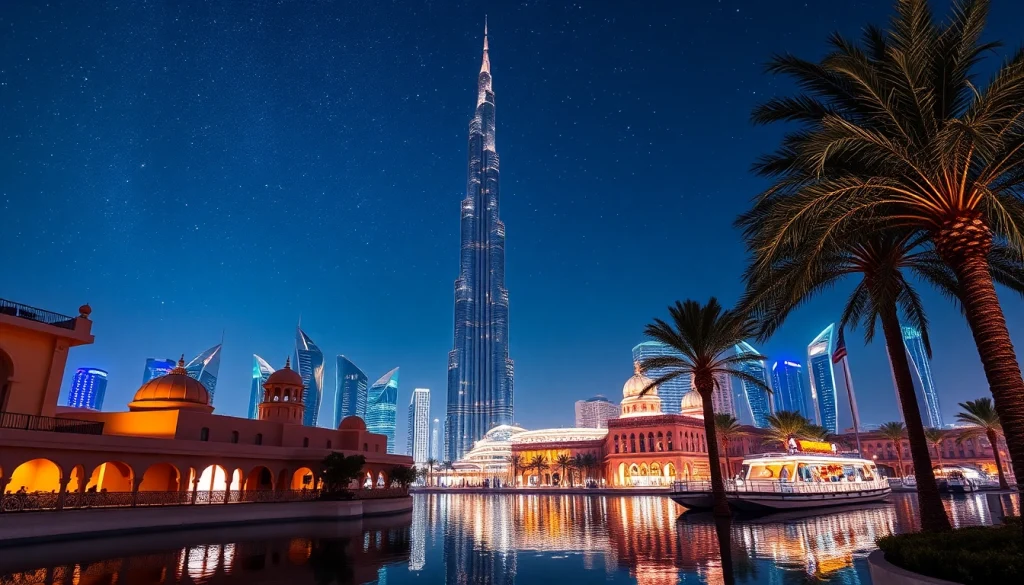Planning Your Dream Travel to Dubai
Understanding Dubai’s Visa Requirements
Before embarking on a journey to the dazzling city of Dubai, it is essential to understand the local visa requirements. For many nationalities, entering the UAE can be a seamless experience. Generally, visitors can obtain a visa on arrival at Dubai International Airport, valid for up to 30 days. However, certain requirements must be met, including holding a passport with at least six months of validity beyond the entry date.
To ensure a smooth travel experience, it’s advisable to check Travel to Dubai for up-to-date information regarding specific visa obligations based on your nationality. In some cases, a pre-arranged visa may be necessary, particularly for long-term stays or for those from countries with stricter entry regulations.
Best Times to Travel to Dubai
Dubai experiences distinct seasons, characterized primarily by a desert climate. The perfect window for a visit is typically between November and March, when the weather is cooler and more inviting for outdoor activities. Daytime temperatures hover around 24°C to 30°C (75°F to 86°F), enabling visitors to partake in everything the city has to offer, from beach lounging to extensive shopping sprees.
Alternatively, summer months between June and September can be extremely hot, with temperatures exceeding 40°C (104°F). Although hotel rates tend to drop during this period, many outdoor attractions are less enjoyable due to the intense heat. Hence, planning your journey around the winter months allows you to maximize your experience.
Budgeting for Your Dubai Adventure
Your travel budget will play a pivotal role in determining your experience in Dubai. Known for its luxury and opulence, costs can steeply rise if one indulges in high-end additions. However, traveling to Dubai on a budget is feasible with proper planning.
Estimate your expenses by considering flight costs, accommodations, food, and entertainment. A rough daily budget can range from $50 to $300 based on accommodation choices — budget hotels versus luxury resorts. Additionally, using public transport, like the Metro and buses, allows you to save considerably while exploring the city.
Top Attractions to Explore in Dubai
Must-See Landmarks: From Burj Khalifa to Desert Safaris
No trip to Dubai is complete without a visit to the Burj Khalifa, the tallest building in the world at a staggering height of 828 meters (2,717 feet). The observation decks on the 124th and 148th floors offer breathtaking panoramic views of the city and beyond. It’s advisable to book your tickets in advance, especially during peak tourist seasons.
Another unmissable experience is a desert safari. These thrilling excursions often begin late afternoon and last into the night. Attendees take part in dune bashing, camel rides, and sandboarding, culminating in a traditional BBQ dinner under the stars while enjoying cultural performances.
Hidden Gems: Unique Experiences in Dubai
While Dubai is famed for its flashy attractions, numerous hidden gems await discovery. For instance, Al Fahidi Historical Neighborhood presents a glimpse into Dubai’s past with its traditional buildings, art galleries, and cultural museums.
Another lesser-known but charming area is the Dubai Creek, where you can take rides on traditional abras (wooden boats) that provide a unique opportunity to connect with the city’s historical trading roots. The peaceful surroundings often offer a refreshing break from the bustling city life.
Cultural Experiences: Museums and Historical Sites
Diving deeper into Dubai’s culture can be easily accomplished through its rich array of museums and historical landmarks. The Dubai Museum, located in Al Fahidi Fort, showcases the Emirate’s history and cultural heritage through intriguing exhibits and artifacts.
For those interested in Islamic culture, visiting the Jumeirah Mosque is recommended. This architectural wonder is open to non-Muslim visitors and offers guided tours that promote understanding and harmony between different cultures.
Dining and Nightlife in Dubai
Best Restaurants for Culinary Delights
Dubai’s culinary scene is as diverse as its residents, offering a variety of dining options from street food stalls to Michelin-starred establishments. Dining at At.mosphere, located on the 122nd floor of the Burj Khalifa, is not just about the food but also about the exquisite views it provides.
For authentic Emirati dishes, Al Fanar Restaurant provides a traditional dining experience with delicious local dishes such as Al Harees and Machboos. Alternatively, the Global Village event during winter showcases cuisines from around the world, making it a fun outing for food enthusiasts.
Top Rooftop Bars for Nighttime Views
As the sun sets, Dubai comes alive with a vibrant nightlife scene that is impossible to miss. Rooftop bars such as the Skyview Bar at the Burj Al Arab offer luxurious settings with stunning views of the Arabian Gulf. It’s an ideal place to unwind with cocktails complemented by delightful sunsets.
Another popular spot is the 360 Lounge at Jumeirah Beach Hotel, providing breathtaking views of the city skyline while you enjoy the lively atmosphere and music. Each location offers a unique vibe and ambiances, making them a must-visit for nightlife lovers.
Exploring Dubai’s Street Food Scene
Dubai is a paradise for street food lovers, with stalls and food trucks scattered across marketplaces, especially at Global Village and the Dubai Marina. Emirates’ culinary diversity reflects in its street food offering, from shawarma to kebabs.
The bustling atmosphere of the Al Karama district features vibrant street stalls serving dishes like falafel, koshari, and samosas. These culinary gems provide affordable yet delicious ways to experience authentic local flavors.
Safety Tips for Traveling to Dubai
Understanding Cultural Norms and Etiquette
Dubai is a city that combines modernity with rich cultural heritage, making it pivotal for visitors to respect local customs and traditions. Dress modestly in public places and be mindful of consuming alcohol only in licensed areas. It is also advisable to learn basic Arabic phrases, as locals appreciate the effort and it enhances interactions.
Public displays of affection are frowned upon, so maintaining decorum is vital. Familiarizing yourself with cultural norms not only ensures a respectful visit but enriches your experience of Dubai’s rich tapestry of customs.
Health and Safety Precautions
Dubai is renowned for its low crime rate, making it a relatively safe destination for tourists. Nonetheless, it is prudent to remain cautious, particularly in crowded areas. Additionally, travelers should have adequate health insurance to cover any potential medical expenses that may arise.
As part of public health protocols, it can be beneficial to check for any travel advisories or health guidelines issued before your travel. Carrying personal hand sanitizers and practicing good hygiene will help ensure a safe and enjoyable trip.
Travel Insurance Tips for Your Dubai Journey
Travel insurance is a crucial aspect of a successful trip to Dubai. A comprehensive policy will cover you for unexpected events, including trip cancellations, lost luggage, and health emergencies. Ensure your travel insurance specifies coverage for activities you plan to engage in, such as desert safaris or water sports, as many standard policies may exclude high-risk activities.
When purchasing travel insurance, consider factors such as coverage limits, deductibles, and reviews from other travelers. An informed choice can provide peace of mind, allowing you to focus on enjoying the city.
Maximizing Your Travel Experience in Dubai
Transportation Options: How to Get Around Dubai
Dubai boasts a modern, efficient transportation system comprising the Metro, trams, buses, and taxis. The Dubai Metro is particularly convenient, connecting major tourist attractions such as Mall of the Emirates, Downtown Dubai, and Dubai Marina. Using Nol Cards, which can be loaded with credit, simplifies payments for all modes of public transport.
Taxis are also readily available but are generally pricier. For a uniquely local experience, consider using an abra to cross the Creek or renting an e-scooter for short distances. Understanding the best transportation methods will enhance your ability to explore the city efficiently.
Managing Time: Suggested Itineraries for First-Time Visitors
When planning your itinerary, it’s important to allocate sufficient time to each experience to avoid feeling rushed. For first-time visitors, a three-day itinerary might include:
- Day 1: Visit the Burj Khalifa and Dubai Mall, followed by an evening desert safari.
- Day 2: Explore Old Dubai, including the Dubai Museum and Al Fahidi district, then visit the Dubai Frame.
- Day 3: Relax at Jumeirah Beach, enjoy water sports, and venture to the Palm Jumeirah before concluding with dinner at a rooftop restaurant for spectacular views.
Final Checklist for Your Travel to Dubai
As you prepare for your travel to Dubai, ensure you’ve checked off vital points on your checklist:
- Confirm your flight and accommodation bookings.
- Gather necessary documentation, including your visa and travel insurance.
- Plan your itinerary and cultural sites to visit.
- Pack appropriately, considering Dubai’s climate and customs.
- Notify your bank of your travel plans to avoid card issues abroad.
By adhering to this checklist, you lay the groundwork for a fulfilling travel experience in Dubai, allowing you to immerse yourself in its wonder while ensuring a smooth adventure.



